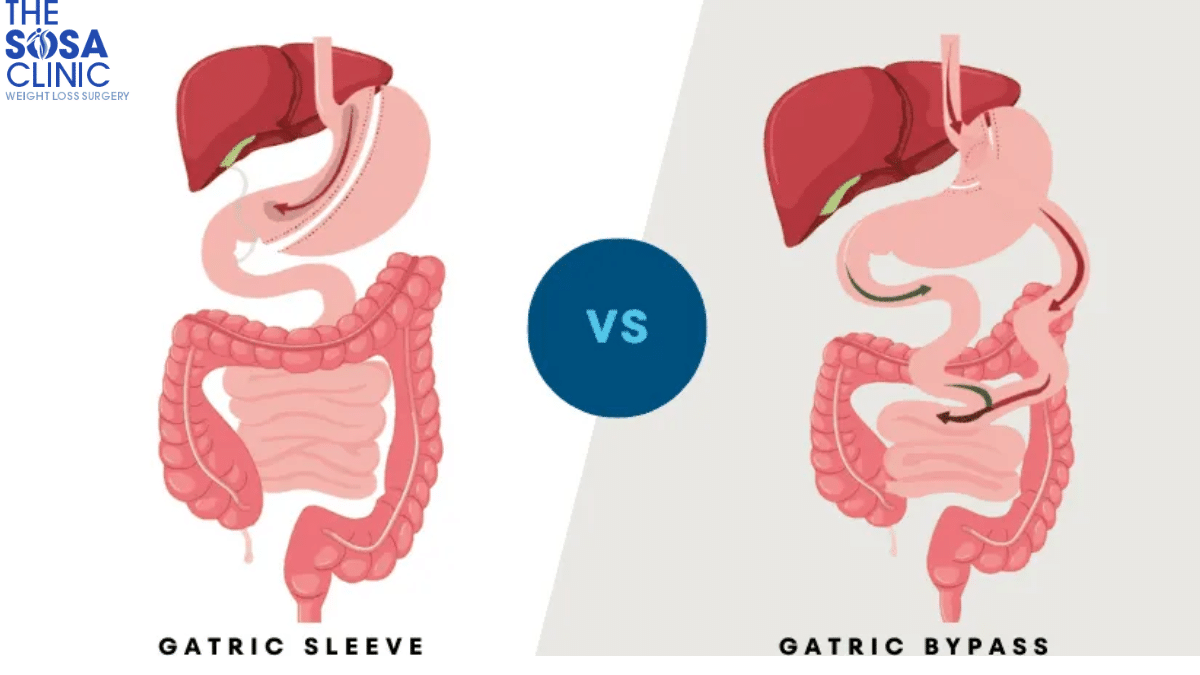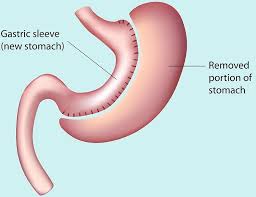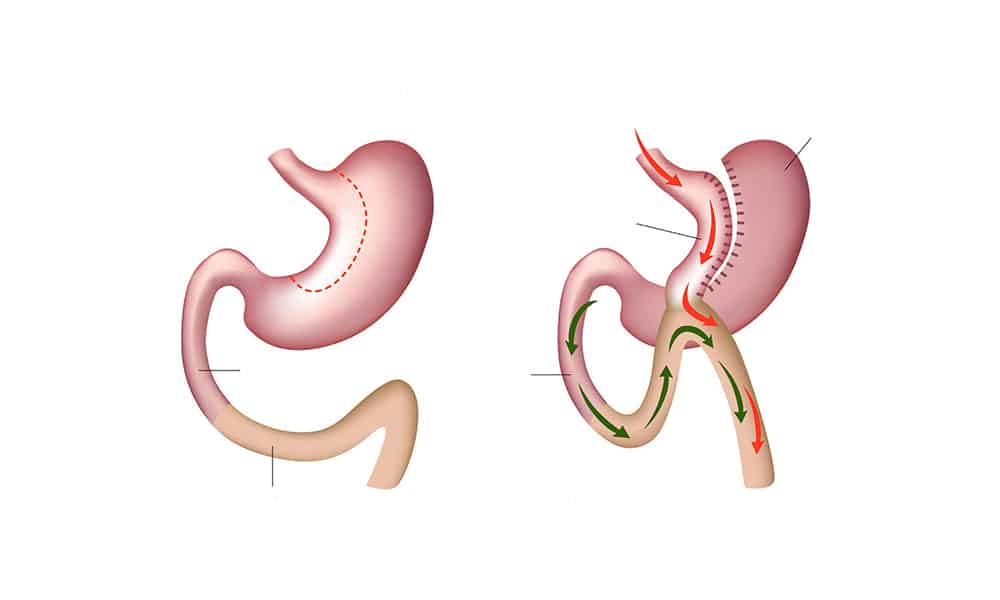Difference Between Gastric Bypass And Gastric Sleeve Surgery

If you have excessive weight and are trying different conservative methods, including medications, physical therapies, exercises, and dieting? But after all these, you are unable to lose weight. In such a situation, when you are unable to lose weight after many conservative practices, surgery is the option. Surgical procedure can be an option for those who have not experienced any relief with non-surgical methods.
The surgery performed for significant weight loss is bariatric surgery. Bariatric surgery is performed for those who are obese and have a BMI of 40 or higher. Bariatric surgery is of different types, including Gastric Bypass and Gastric Sleeve Surgery. Both surgical procedures are performed for weight loss and offer effective results. The procedure performed may vary depending on various factors, including overall health and the complexity of the condition. It is crucial to consult an experienced bariatric surgeon for an appropriate weight loss surgical procedure. If you want to know about what are the differences between Gastric Bypass and Gastric Sleeve surgery, then this guide can help you.
Bariatric Surgery Explained: Sleeve Gastrectomy and Gastric Bypass
Let’s first understand what a bariatric surgery is. Bariatric surgery is a non-conservative surgery that is performed for those who have excessive weight or are obese. This surgical approach can offer effective results for those patients who have excessive weight. Gastric sleeve and Gastric Bypass surgery are types of bariatric surgery. These two types of surgery are known for offering significant weight loss, but at some points, these surgical procedures can differ from each other, and below is a comparative analysis of both procedures.
Gastric Bypass vs. Gastric Sleeve: A Comparative Analysis
| Sr. No. | Features | Gastric Sleeve | Gastric Bypass |
|
|
Procedure | This procedure involves the removal of the large part of the stomach and leaves a small pouch. | In this procedure, a small stomach pouch is created, and the small intestine is attached. |
|
|
Mechanism | The mechanism of the gastric sleeve is restrictive, which limits food intake. | This procedure is restrictive and malabsorptive, which limits food intake and absorption |
|
|
Invasive | This procedure is less invasive. | Gastric bypass is a more invasive surgical procedure than the gastric sleeve. |
|
|
Intestinal Changes | No rerouting of the small intestine | The small intestine is reconnected to the stomach pouch |
|
|
Weight Loss | This surgical approach offers significant weight loss. | Gastric bypass is a well-known surgical procedure for weight loss. |
|
|
Complications | Gastric Sleeve comes with a lower risk of dumping syndrome. | Gastric bypass involves a higher risk of dumping syndrome. |
|
|
Nutrient Absorption | More normal nutrient absorption | Some nutrients may be less well absorbed |
|
|
Recovery | An individual may experience quicker recovery after the surgical procedure is performed. | After this surgical procedure, one may experience a longer recovery. |
|
|
Costs | Gastric sleeve is a less expensive surgical procedure. | Gastric bypass is a more expensive procedure for weight loss. |
|
|
Long-term Benefits | Gastric sleeve offers long-term benefits for significant weight loss and improved quality of life. | Gastric Bypass can offer several benefits, along with improved life quality. |
|
|
Effects (long-term) | After this surgical procedure, one can regain weight. | After this surgical procedure, the possibility of weight gain is low. |
|
|
Considered best for | For those with a BMI of 35-40 gastric sleeve is considered best. | Patients with a BMI of over 40 with other medical conditions are eligible for gastric bypass. |
What do I Need to Expect During these Surgical Procedures?
Gastric Sleeve Surgery:
Gastric Sleeve Surgery is a less invasive surgical procedure for offering significant weight loss. During the Gastric Sleeve surgery, you can expect:
- The surgical procedure is performed under general anesthesia, which ensures you don’t feel any pain during the procedure.
- It is a laparoscopic approach in which small incisions are made during the procedure in your abdomen.
- In this procedure, the bariatric surgeon removes a large portion of your stomach and gives it a shape in which the remaining portion of the stomach is changed into a tube-like structure.
- A device that is used to create a small pouch in the stomach.
- This surgical procedure may take the time of 1 to 2 hours.
After Surgery:
- After the surgery is performed, the patient needs to stay in the hospital for a few days to ensure that there is no complication.
- For pain management, one is given the medications prescribed by the surgeon.
- The recovery process after the surgery may take time of 2-4 weeks, depending on different factors.
- It is essential to take care of the incision made during the procedure.
- You need to make some significant changes in your diet and need to follow a strict diet as recommended by the surgeon.
Gastric Bypass Surgery:
Gastric Bypass Surgery is a procedure that differs from gastric sleeve surgery by the procedure. The procedure performed for gastric bypass surgery may include:
- The procedure starts by giving a general anesthesia to the patient, which ensures that you remains unconscious during the surgery and the procedure becomes painless for you.
- In this procedure, the surgeon divides your stomach into a small pouch.
- This procedure may include the cutting of the small intestine, which is connected to a new pouch. The food enters this pouch first and then into the lower portion of the small intestine.
- It is a surgical procedure that can be performed with traditional or open incisions or by using small incisions.
- This surgical process may take a few hours.
After the surgery:
You may experience these after the gastric bypass surgery is performed, including:
- After the surgery is performed, you are taken to the recovery area, where you are kept under monitoring.
- One may need to stay in the hospital for a few days.
- For pain management, pain medications are given to manage the discomfort.
- Changes in the diet are required after the surgical procedure, gastric bypass.
- Some supplements (Vitamin D, calcium, and iron) should be in your diet and nutrient intake.
- You need to adopt some lifestyle modifications that involve regular exercise and reduced consumption of alcohol for faster recovery and a higher success rate of the surgery.
Which one is more effective: Gastric Bypass or Gastric Sleeve Surgery?
For the question, “Which one is more effective: Gastric Bypass or Gastric Sleeve Surgery?”, the answer is that both procedures have their effectiveness depending on different factors. The different factors on which the effectiveness of both procedures depends may include the overall health of the patient, medical history, BMI, and the complexity of the condition of patient. The choice of the effective procedure can depend on these factors, it is important to schedule a consultation with an experienced bariatric surgeon. An experienced bariatric surgeon can assess the condition of the patient and can recommend the most suitable and effective surgical procedure for the patient.
Conclusion
Gastric Bypass and Gastric Sleeve Surgery are both weight-loss procedures that are highly effective for significant weight loss for the long term. These two procedures are considered best for the improvement of the obesity-related health issues, including sleep apnea. These surgical weight-loss procedures can be effective for those who are obese and are not able to lose weight with the conservative methods of weight loss, such as medications, exercise, physical therapies, and others. Consult a bariatric surgeon for the effective and appropriate surgical method according to your condition.
People May Also Ask For Gastric Bypass And Gastric Sleeve Surgery:
Question 1. Which surgical procedure, among Gastric Bypass and Gastric Sleeve Surgery, has a higher success rate?
Answer. Gastric Bypass and Gastric Sleeve Surgery can offer effective results for weight loss. Both surgical procedures can offer significant weight loss in the long term. Among Gastric Bypass and Gastric Sleeve Surgery, gastric bypass offers higher success rates for weight loss. The outcomes of the surgical procedures can vary depending on the health and preferences of the patients.
Question 2. Do I need to change my diet after Gastric Sleeve surgery for weight loss?
Answer. Yes, it is required for a significant change in the diet after the surgical procedure is performed. In the initial phase of the recovery after the surgical procedure, a strict diet is required for quick healing and management of weight loss. After a long time since the surgery, the patient can have a normal diet, but it is essential to focus on a healthy diet that can help maintain the long-term success of the significant weight loss of the surgery.
Question 3. What can I expect after the Gastric Bypass surgery?
Answer. Gastric bypass is a surgical procedure that is performed for individuals who are obese and want to lose significant weight. In this procedure, you can expect a smaller stomach that makes you feel full after the consumption of less food. This procedure also involves the bypassing of the small intestine, which can reduce the calorie intake. You need to follow a strict diet plan immediately after the surgery, and after a few days, you can resume your normal diet with the special guidelines of the surgeon.
Question 4. Which bariatric surgery procedure takes the longest time for recovery?
Answer. Gastric bypass surgery takes a longer time for recovery, whereas the gastric sleeve surgery can offer a quicker recovery. Both procedures are performed for weight loss. After both procedures are performed, you need to stay in the hospital for a few days, and after a few weeks, you may experience recovery. Gastric Sleeve surgery can take a time of 2-3 weeks for recovery; on the other hand, gastric bypass can take 4-6 weeks for full recovery.


